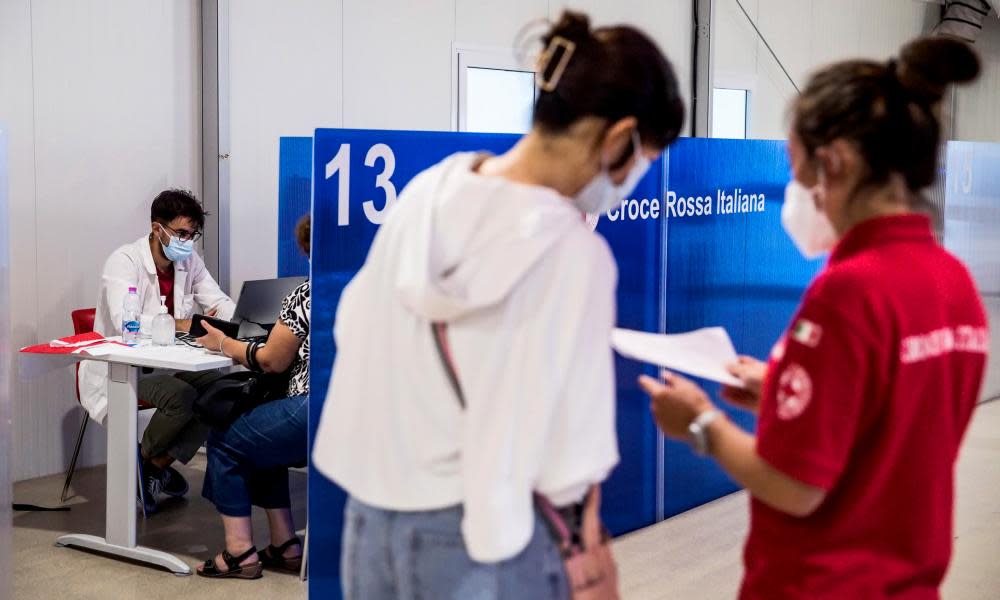‘I need to work’: Italy’s green pass rule triggers rise in Covid jab uptake

At the vaccination hub outside Termini train station in Rome, a steady flow of people have been turning up for their first Covid vaccine dose in recent days. The mood is begrudging. “If I didn’t have to do it, I wouldn’t,” said Rosanna Barbuto, a supermarket worker. Catalin, 41, who works in a factory, said: “I’m taking it because I need to work.”
They are among the vaccine-hesitant who caved in after Italy made it mandatory for all workers to present a so-called green pass to access their workplaces. The rules are the strictest in Europe and require workers to present proof of vaccination, immunity or of a negative test taken within the previous 48 hours. Some see Italy’s cautious approach as the key to its current low infection rate.
Barbuto, 59, said she was not against vaccinations, and took the flu jab every year. “I didn’t want to take the one for coronavirus as I wasn’t sure how safe it is. I was afraid. People were talking about the side-effects and then there were all these protests. But I need to work and so need the green pass, and I don’t want to keep spending money on tests.”
Elia works in a shopping centre and he, too, felt obliged to have the vaccine to continue to work. Those who break the green pass rules risk being suspended without pay or fined up to €1,500 (£1,270). Employers can be fined for failing to check if staff are complying.
“I was cautious because my wife and I want to have a baby and so we were taking our time to decide … but when the green pass came in for the workplace, we felt we had to do it,” said Elia. “We are not against vaccinations but don’t agree with the way the government has gone about this, telling people they can’t work if they don’t have this pass. They should have been more direct and made the vaccine an obligation instead of sneaking around the issue in this way.”
Italy’s goal with the green pass is to boost inoculations so as to reach its target coverage of 90% of the population by the end of October and to avoid another lockdown. As of Wednesday, 81% of the population aged over 12 were fully vaccinated.
The pass – also required to dine inside at restaurants, to enter museums, theatres, cinemas and stadiums, and for travel on planes and long-distance trains – was brought in over the summer in combination with the maintenance of other coronavirus measures, such as wearing face masks inside shops and when using public transport.
default
The seven-day average of new cases in Italy was 2,686 on Wednesday, down from 6,200 on 20 August and 14,003 on 20 April, a week before Italy began the gradual easing of lockdown restrictions and as the vaccination campaign was ramped up. Deaths have fallen from an average 440 in mid-April to 36 on Wednesday. However, at 131,688, the country has the second-highest death toll in Europe after the UK.
A study published on Wednesday found that the average age of vaccinated people who had died was 85 and who, on average, had five underlying illnesses.
Although the green pass has triggered sometimes violent protests, the majority of Italians are taking it in their stride, with 65% supporting the measure in a survey last week.
Related: Italy imposes ‘green pass’ restrictions on unvaccinated people
“We’re in a privileged place, the situation is finally being well managed by the government,” said Gianfranco Cappelluzzo, who was at the Termini vaccine hub waiting for his mother while she received a booster jab. “I support the green pass and find it foolish to be against it as we’re seeing evidence that it’s the right thing to do. Fortunately, resistance to this logic is marginal.”
A staff member at the hub said they had seen a gradual rise in Covid-19 vaccine first-timers since September. Nationally, the workplace rule triggered an instant increase in the number of bookings for first doses when it took effect last Friday. However, that figure appears to have tailed off over the last few days, with a higher number of bookings being made for booster shots.
“I’ll have my third dose when the time comes around,” said Cappelluzzo. “We can’t give up.”
The government has also dismissed the idea of making Covid-19 tests free, as a further way to sway people towards having the vaccine instead.
Giuseppe Longho, the owner of a chemist in Rome’s Esquilino district, has been selling coronavirus tests costing €22 each for about a year. The queue for the tests has grown longer since Friday.
“But we’ve been trying to convince customers to have the vaccine, especially those who are using the system to continue to work,” he said. “We don’t always succeed as many are angry and there is no way to negotiate. But some are realising that having to get tested every couple of days is tiresome and costly, and so they are starting to come to terms with having the vaccine.”

 Yahoo Movies
Yahoo Movies 
